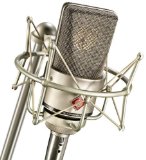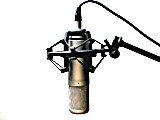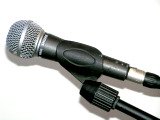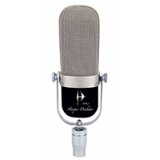Studio Microphone

The Studio Microphone is used to capture sound and interpret it as closely as possible to the original sound.
Although you can use the studio recording microphone to put a specific charateristic into the sound of the instrument.
There are three types of microphones for the home studio:
- Condenser Mic
- Dynamic Mic
- Ribbon Mic
And there are three Polar Patterns or ways they pick up sound:
- Cardioid
- Omnidirectional
- Figure 8
The Microphones
Condenser Mic:

They are sensitive and accurate.
When recording vocals, guitar and piano you need to be able to, record every sound accurately, even when the instrument or vocals are quiet.
They can have a large diaphragm or small diaphragm.
Large diaphragm have more pronounced low frequencies. They also have lower noise that is created by the mic. They tend to be more popular. The small diaphragm mics have a more even frequency response and work better with high frequency instruments.
The can be tube or solid-state.
The vacuum tube mic have softer high frequencies, and a warmer overall tone. The solid state or transistor are transparent and tend to have less coloration.
They need a small amount of voltage, either phantom power or internal battery.
With phantom power you need to have a preamp or mixer that will supply the voltage. Tube mics normally come with a power supply that supplies the phantom power. With a battery condenser mic, if the battery is low the quality of the recording can be affected. This is a very popular type to use as a studio microphone.
Dynamic Mic:

They are durable.
They can withstand rough handling so tend to be used for live the performance.
They can handle loud volumes.
This makes them a good choice when recording drums, loud guitar amplifiers or any sound with loud signals.
They are less transparent.
The can put dirty or gritty sound into the recording, this can be good if you want to have that sound in your recording.
The sound can be boxy.
The high and low frequencies are not as accurate. They are good for mid frequency sound.
Ribbon Mic:

They are fragile.
A strong breath from a singer can break the diaphragm.
They have a silky smooth sound.
The high frequencies roll off and low frequencies blend together.
They can be expensive
Although the price is coming down. Because of this they are becoming a more popular type of studio microphone.
Which Is The Best Studio Microphone?
If you have one good Large Diaphragm Multiple-patterned Condenser Mic, this will do for most your recordings.
As your studio grows you can add different types of microphones to get more variety in your recordings.




